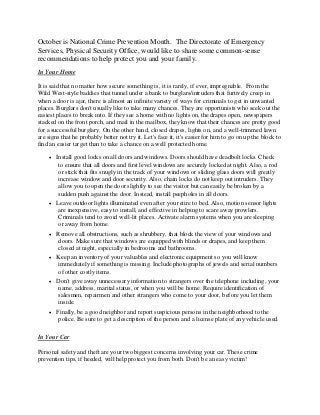
National Crime Prevention Month
- 1. October is National Crime Prevention Month. The Directorate of Emergency Services, Physical Security Office, would like to share some common-sense recommendations to help protect you and your family. In Your Home It is said that no matter how secure something is, it is rarely, if ever, impregnable. From the Wild West-style baddies that tunnel under a bank to burglars/intruders that furtively creep in when a door is ajar, there is almost an infinite variety of ways for criminals to get in unwanted places. Burglars don't usually like to take many chances. They are opportunists who seek out the easiest places to break into. If they see a home with no lights on, the drapes open, newspapers stacked on the front porch, and mail in the mailbox, they know that their chances are pretty good for a successful burglary. On the other hand, closed drapes, lights on, and a well-trimmed lawn are signs that he probably better not try it. Let's face it, it's easier for him to go on up the block to find an easier target than to take a chance on a well protected home. Install good locks on all doors and windows. Doors should have deadbolt locks. Check to ensure that all doors and first level windows are securely locked at night. Also, a rod or stick that fits snugly in the track of your windows or sliding glass doors will greatly increase window and door security. Also, chain locks do not keep out intruders. They allow you to open the door slightly to see the visitor but can easily be broken by a sudden push against the door. Instead, install peepholes in all doors. Leave outdoor lights illuminated even after you retire to bed. Also, motion sensor lights are inexpensive, easy to install, and effective in helping to scare away prowlers. Criminals tend to avoid well-lit places. Activate alarm systems when you are sleeping or away from home. Remove all obstructions, such as shrubbery, that block the view of your windows and doors. Make sure that windows are equipped with blinds or drapes, and keep them closed at night, especially in bedrooms and bathrooms. Keep an inventory of your valuables and electronic equipment so you will know immediately if something is missing. Include photographs of jewels and serial numbers of other costly items. Don't give away unnecessary information to strangers over the telephone including, your name, address, marital status, or when you will be home. Require identification of salesmen, repairmen and other strangers who come to your door, before you let them inside. Finally, be a good neighbor and report suspicious persons in the neighborhood to the police. Be sure to get a description of the person and a license plate of any vehicle used. In Your Car Personal safety and theft are your two biggest concerns involving your car. These crime prevention tips, if heeded, will help protect you from both. Don't be an easy victim!
- 2. Always lock your car and carry your keys with you. Don't keep an extra key "hidden" anywhere on the car, thieves know where to look. When away from the car keep all valuables in your trunk, not in view. Don't pick up hitchhikers, and don't be one yourself. Park your car only in well lighted lots, as close to traveled areas as possible. When leaving a building to go to your car, have your keys ready to use and walk with others whenever possible. Check to make sure that your car is empty before you get into it, and lock your doors once inside. If you think that you are being followed, drive to a nearby well-lit and busy business establishment or other public place to call the police. If you can't get out of your car, honk the horn to attract attention. If you have car trouble, stay in your car and lock yourself in. If another motorist stops to offer help, roll down your window slightly and ask him to call the police or a tow truck for you. Don't get out of the car until identified help arrives. Personal Safety Self-protection means using good common sense. If you will follow these simple tips, you can help prevent getting yourself into potentially dangerous situations. The best defense is to use your head. Always be aware of your surroundings and alert to possible danger. Don't walk alone at night, and always walk in well-lighted areas. Walk near the curb, away from buildings, dark doorways, and shrubbery where someone might be hiding. Don't accept rides from strangers. Try to let someone know where you're going and when you expect to be home. If you must travel or walk by yourself at night, always be on the defensive. Give an impression of someone who is determined and walk purposefully. If you suspect a problem, go directly to the nearest public place and call the police. Do not remain passive if anyone touches you offensively. Attract attention! When you return home at night, be sure to have an outside light burning, and have your door keys in your hand before you get to the door.
